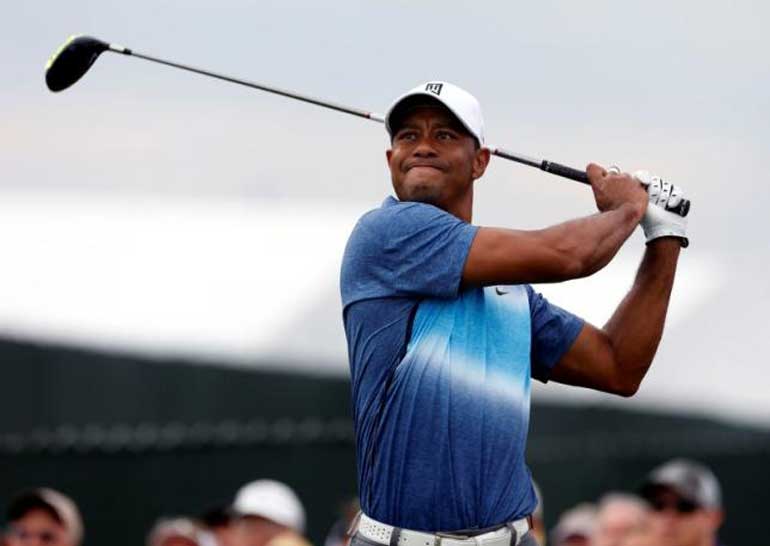Sunday Feb 22, 2026
Sunday Feb 22, 2026
Thursday, 31 December 2015 00:00 - - {{hitsCtrl.values.hits}}

As Tiger Woods celebrates his 40th birthday on Wednesday, he must be struck by the fact that time stands still for no one and he will face a different golfing landscape when, or if, he returns to competition in 2016.
Less than two years ago, and even as recently as last year, many Tiger fans still eagerly anticipated the day when, so they thought, he would match the record of 18 major championship victories held by Jack Nicklaus.
Woods had won five PGA Tour events in 2013 and, though major silverware had eluded him since 2008, there seemed no reason why he could not add to his haul of 14 majors as long as he stayed healthy.
But everything changed in 2014 when, crippled by back pain that forced him out of a tournament in Florida, he underwent back surgery in the form of a microdiscectomy. He has never been the same since.
Two further back surgeries later, expectations these days about the former world number one are much more muted.
Instead of discussion about whether Woods will win four or five more majors, talk has turned to whether he will even win another regular tournament, let alone one of the big four.
No longer is winning the ‘be all and end all’. Having a healthy body is priority number one.
“Even if I don’t come back and I don’t play again, I still want to have a quality of life with my kids. I started to lose that with the other surgeries,” Woods told Time magazine in early December.
“(Not being able to play again is) not what I want to have happen and it’s not what I’m planning on having happen, but if it does, it does. I’ve reconciled myself to it.”
Father Time catches up with everyone. Dating back to 1965, players aged 40 or older have won only 18 of the 204 majors played, a winning rate of less than nine percent. The reason is open for debate. Do the players’ physical skills decline, or does mental baggage finally take a toll on their confidence? Is it a combination of both?
Sports science expert Vern McMillan believes many golfers do not train appropriately, focusing too much on strength training instead of maintaining their fluid movement patterns.
“These guys get stuck on power and lifting weights and the body loses the ability to move because they don’t spend the time on improving their body’s ability to move,” McMillan, who has worked with several leading golfers, told Reuters.
Woods is renowned for his love of weight training. But did that focus do him more harm than good?
Perhaps a more realistic target for Woods than adding to his major haul is the record number of 82 PGA Tour victories set by Sam Snead. Woods is three shy of that mark.
He showed in contending at the Wyndham Championship in August that he can still be competitive, but there is a huge difference between being competitive and dominating.
It is a matter of semantics to debate whether Woods or Nicklaus is the greatest player ever. Some people choose Woods, saying his best golf was superior to Nicklaus’s, but the Golden Bear showed greater durability for the long haul.
Nicklaus clinched his 16th and 17th majors at the age of 40, before adding an 18th at the age of 46.
The only player other than Nicklaus to win multiple majors in his 40s since 1965 was Mark O’Meara, who won twice at the age of 41.
Nicklaus recently told Reuters he still thought Woods had a chance of matching his major record, but what else could he say? Had he written off Woods, he might have come across as arrogant.
It is too early to assign the moniker of “ceremonial golfer” on Woods, but that time may not be far away if his back does not properly heal.
In accepting a role as an assistant captain to Davis Love III on next year’s United States Ryder Cup team, Woods may be ready to move onto a new phase of his life ... maybe.
Just a couple of weeks after saying he was “reconciled” to the possibility of not playing at a high level again, Woods struck a different tone.
“Physically, sometimes I feel old and sometimes I feel like a teenager,” he wrote last week in a blog on the PGA Tour’s website. “I don’t like the polar opposites of the two. I’d like to be somewhere in the middle where I feel 40.
“Where do I see myself in the next five to 10 years? I am still playing golf at the highest level and winning tournaments and major championships.”
Realistic comments, or a pipe dream laid out by somebody trying to come to terms with his physical limitations? Only time will tell.